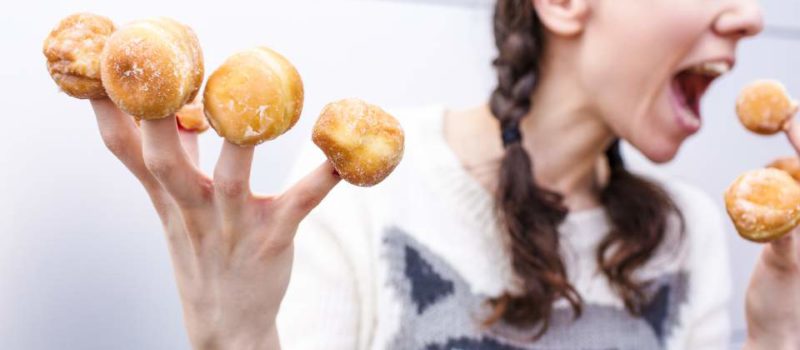When I went on one of my diets, I shared with my husband that I usually eat when I’m not hungry at all, and it’s hard for me to just stop eating all the time. He said that I’m lucky. That he eats when he’s hungry so it would be difficult for him to try to lose weight because he’d be left hungry if he ate less, and I can just cut down on food and not have to deal with hunger. Ha! Goes to show you that people who don’t suffer from emotional eating don’t really understand it and how tough it is to conquer this behavior.
Yes, we should eat only when we’re hungry. But many of us eat when we suddenly have a craving for something, even when we don’t feel hungry at all. We can eat one snack after another, and because we’re not trying to satisfy hunger, but something else, it’s very difficult to hit the spot where we’d feel we’ve had enough. We’re using food not to fulfil hunger but to comfort and distract us.
Food is sometimes used when it’s hard to deal with difficult issues we’re facing. We could be struggling with financial difficulties, health issue, relationship troubles, work stress, and more. True, some people tend to hardly eat when they’re facing these situations, but others automatically turn to impulsive eating and consume whatever is available, without even enjoying the food. Our brains can become wired so we automatically reach out for food when we’re experiencing negative emotions without even thinking about that.
We also use food to subconsciously self-sabotage us. I went on countless diets, was able to stick with them nicely, and as just the pounds started coming off, I would go into unstoppable binge eating. I now understand that my brain was trying to protect my perceived identity. If I’m used to thinking of myself as an unthin person, I would subconsciously feel that something is off when I start looking thinner and thinner.
Food becomes a (temporary) distractor, but it doesn’t solve the issues we’re facing with, and it causes more problems for us.
How to know if you’re eating because you’re emotionally hungry and not physically hungry:
- You suddenly feel an overwhelming hunger. A physical hunger develops gradually
- You crave specific food (fatty and sugary) and want to eat more and more until you’re absolutely stuffed. When you’re physically hungry almost anything will sound good and you’ll stop eating when your stomach is full.
- After you eat you feel bad about yourself.
Let’s say you’ve identified yourself as an emotional eater. How to deal when the cravings hit again? Here are some tips that are working for me:
- Identify your triggers. Do you eat out of boredom, to give yourself something to do? Out of childhood habits? Out of stress or dealing with negative emotions?
- Find other ways to deal with your feelings. If it’s boredom, you can go read a book or exercise. You can talk with a relative or a friend if you’re depressed. I absolutely recommend the book The Power of Habit: Why We Do What We Do In Life and Business by Charles Duhigg. It discusses how habits are an automatic response to specific triggers, and how we can deliberately work at changing our automatic responses to these triggers.
- Write down all the reasons you have for wanting to lose weight. When you feel like you’re about to eat emotionally, read the list and think if you still value the benefits of losing weight. Tell yourself you’re not really hungry and remind yourself how bad you’ll feel if you give it. Read my post Let’s Stop Fooling Ourselves for how to be ready with answers when we try to convince ourselves it’s OK to eat something we know we shouldn’t.
- Practice relaxation techniques. Stress releases the hormone cortisol which causes weight gain. This happens as cortisol mobilizes triglycerides from storage to visceral fat cells and by suppressing insulin levels which causes the body cells to be starved for sugar. That triggers cravings for high-calorie food. Cortisol causes other health issues, such as blood pressure, depression, and the list goes on. Have a glass of beverage (no- or low-calorie) to drink slowly, practice yoga, guided imagery, deep breathing, meditation. Find what makes your body relax.


Thank you for recommending this book. I have heard about it from one of my friends that used many diet programs with no luck and recommended this book as well
I’m glad to hear this book was recommended to you by others as well. Let me know what you think of the book if you get a chance to read it!